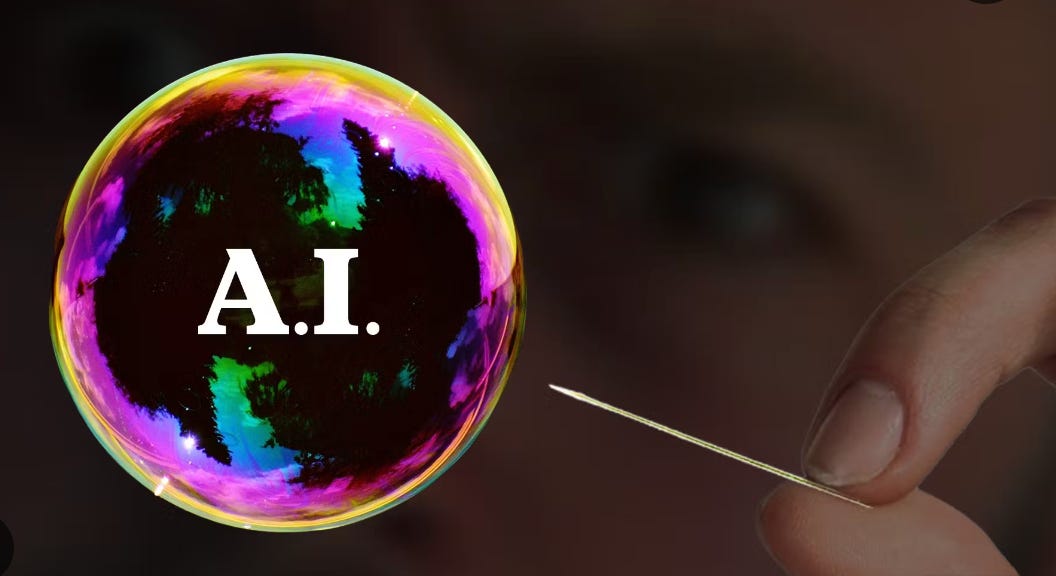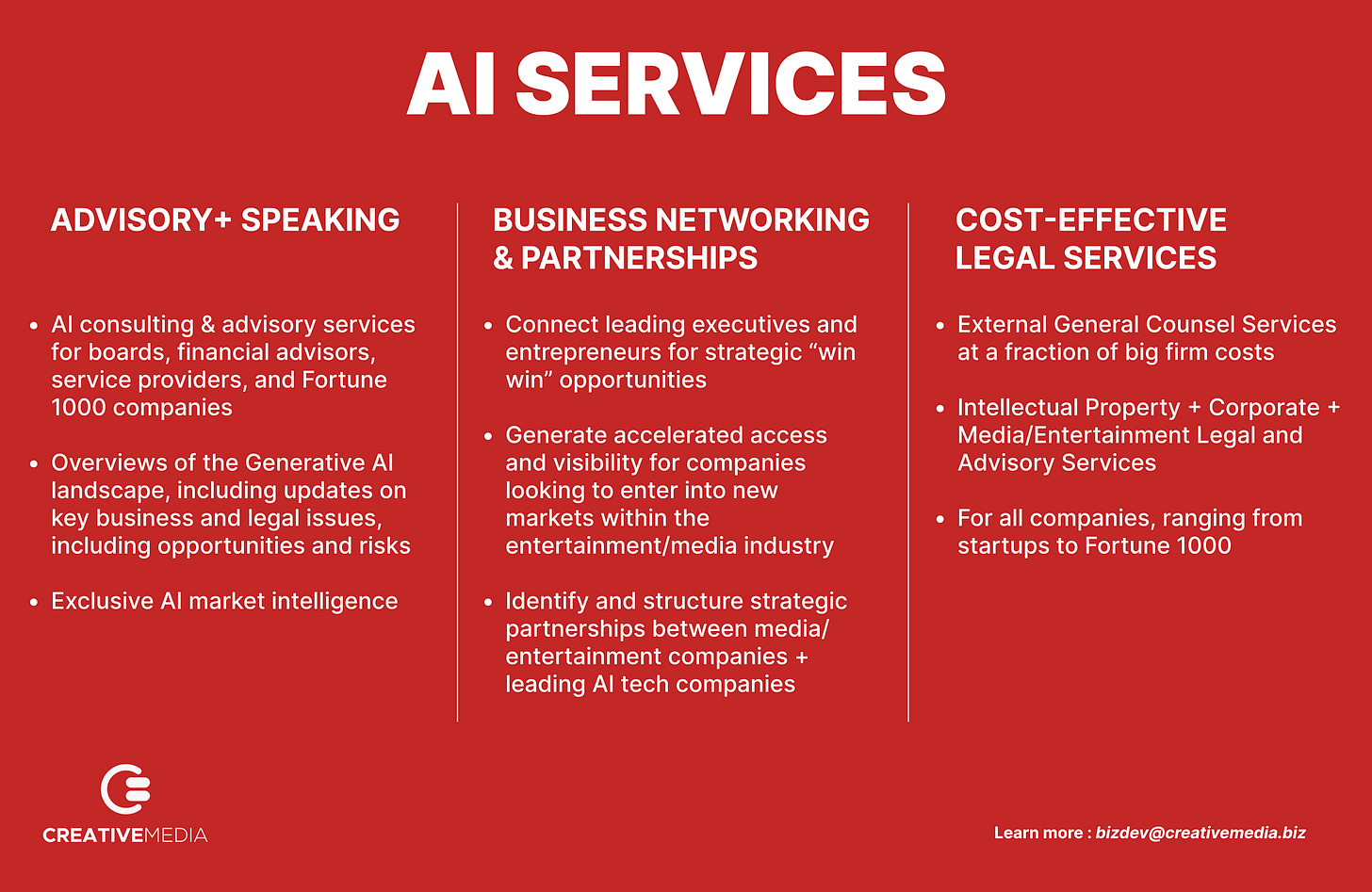No, We Are Not In An AI "Bubble"
Yes, Most VC-Backed AI Investments Will Fail, But AI's Long-Term Transformation Is Real (& This Week's Nvidia Earnings Call Will Offer Some Clues)
Wake up people. It’s generative AI/media brAIn dump time! First, it’s “the interv(AI)ew” (this week’s is with CEO Ben Gottendiem of “ethically trained” generative voice company Narrativ, which just scored a high profile deal with SAG). Next, it’s “the mAIn event” (this week’s takes on — and challenges — the notion that we are in an over-hyped AI “bubble”). Finally, “the AI case tracker” - updates on the key genAI-focused copyright infringement cases (& the growing number of them).
I. The Interv(AI)ew: CEO Ben Gottendiem of GenAI Voice Company Narrativ (& His New Deal with SAG-AFTRA)
Last week, I featured my exclusive interview with CEO Shara Senderoff of “ethically trained” generative music company Jen Music (you can watch it here). This week it’s Narrativ CEO Ben Gottendiem’s turn. He too takes an “ethically trained” approach unlike most other genAI companies — a strategy that is reflected in Narrativ’s new deal with SAG-AFTRA. Narrativ bills itself as “a marketplace for advertisers to license talent audio AI likeness.” What does that mean? We discuss it all in my exclusive interview that you can watch below.
You can also listen to my interview with Ben on “the brAIn” podcast (via this link). All episodes are available on all major podcast networks. Please follow it, rate it, and share it. I record it myself (so you get my “flavor”). No AI/synthetic voices here!
II. the mAIn event - No, We are NOT in an AI “Bubble”
Everyone seems to be asking the same question: “Are we in an AI bubble?” Will AI — and the hundreds of billions of dollars already invested in it — ultimately be seen as a boon or an overhyped bust? I participated in a Streaming Media debate on this topic late last week, in fact, with other leading experts deeply immersed in it all. You can watch it right here via this link (or button).
On the “bust” and overhyped side of the argument, a new RAND Corporation report supports a pessimist’s view — i.e., that most AI projects are destined to fail. The study, based on interviews with 65 experienced data scientists and engineers, states: “By some estimates, more than 80 percent of AI projects fail.” It further states: “This is twice the already-high rate of failure in corporate information technology (IT) projects that do not involve AI.”
But here's the thing. The fail rate for Internet-based projects and investments during the early days of the Internet boom — the dot-com v1 era in the late 1990’s and early 2000’s — is also estimated to be in that same 75%-90% range (according to reports by The Harvard Business Review and others cited by ChatGPT). (NOTE: yes, I used ChatGPT for some research, so I do urge a note of caution). Those dot-com failures were due to many factors, including boatloads of hype (and lemming like VC behavior that frequently follows it), over-valuation, and lack of sustainable business models.
Sound familiar?
But let’s not forget that we are less than 2 years since OpenAI unleashed ChatGPT to a largely unsuspecting world. And, ultimately, the Internet transformed society and birthed the most valuable companies in the world (Google, Amazon, Meta, TikTok). So — even though the dot-com bust was very real and very painful more than 20 years ago — the Internet’s journey to deep integration into all aspects of our lives may also prove to be prescient with AI.
And I believe it will.
In fact, it already is. Nvidia finds itself at the top of the overall market cap food chain once again, rising 30% in the past few weeks. And I anticipate that it will kill it once again this Wednesday the 28th when they announce their quarterly earnings. Meanwhile, as another data point, Meta just announced major gains that it directly attributes to its increasing use of AI (you can read more here via this link).
And remember, according to Bloomberg, the collective investment into AI will exceed $1 trillion by 2030. So there’s a lot of incentive to create entirely new markets. AI — apart from transforming media and entertainment — is focused on solving the most critical and even existential problems on the planet, including climate change, new life-saving drugs, and healthcare.
So while I do believe that most VC-backed AI investments will fail in the short-term simply due to the inability to compete with the gargantuan resources of Microsoft/OpenAI, Google, Amazon/Anthropic, and Meta, the long-term market opportunity is too vast to deny.
And today’s AI-curious VC investors learned their lessons the hard way from the Internet “bubble” days more than two decades ago. Back then, VC’s took — or tried to take — scores of companies public. And that froth led to the big “crash.” We don’t see that happening here (at least, not yet) with AI. Most VC’s today understand the massive risks involved with trying to compete with the Big Tech genAI illuminati and their other-worldly resources. That’s why you see even highly-pedigreed generative AI companies like Inflection and Character.AI essentially being absorbed into the Big Tech behemoths. Why fight the power (when you can work within it)?
Perhaps most importantly, even if we mere mortals believe we can anticipate the most significant long-term use cases for AI — judging by past tech-tonic shifts (the Internet, mobile/smartphones) — we simply can’t. The Internet spawned countless massive market opportunities that were never anticipated. AWS is just one of them. And later, the mobile/smartphone revolution spawned an entirely new App Economy that catapulted Apple into the stratosphere.
Who would have predicted that?
Send me your feedback to peter@creativemedia.biz.
III. the AI legal case tracker - updates on key AI litigation
I lay out the facts - and the latest developments - via this link to the “AI case tracker” tab on “the brAIn” website. You’ll get everything you need (including my detailed analysis of each case) of the cases listed below. Lots of legal AI-ctivity this past week, as always. New lawsuits to know. So little time to know them. Bottom line: generative AI companies should get access to the content they need (it’s “data” to them) by seeking consent and compensation, rather than by falling on their swords in court litigation.
(1) The New York Times v. Microsoft & OpenAI
(2) UMG Recordings v. Suno
(3) UMG Recordings v. Uncharted Labs (d/b/a Udio)
(4) Universal Music Group, et al. v. Anthropic
(5) Sarah Silverman, et al. v. Meta (class action)
(6) Sarah Silverman v. OpenAI (class action)
(7) Getty Images v. Stability AI and Midjourney








I haven’t watched the debate, but with the summary it seems like there is some equivocation for what a “bubble” means. AI can be a long-term viable solution just as the internet was, but that doesn’t stop the fact that there was a bubble with the .com era and likely is one now. Usually what I understand by “bubble” is an investment speculation frenzy disconnected from the underlying economic viability of a particular trend. Even if long-term the technology is viable that doesn’t mean the near-term speculative investments track.